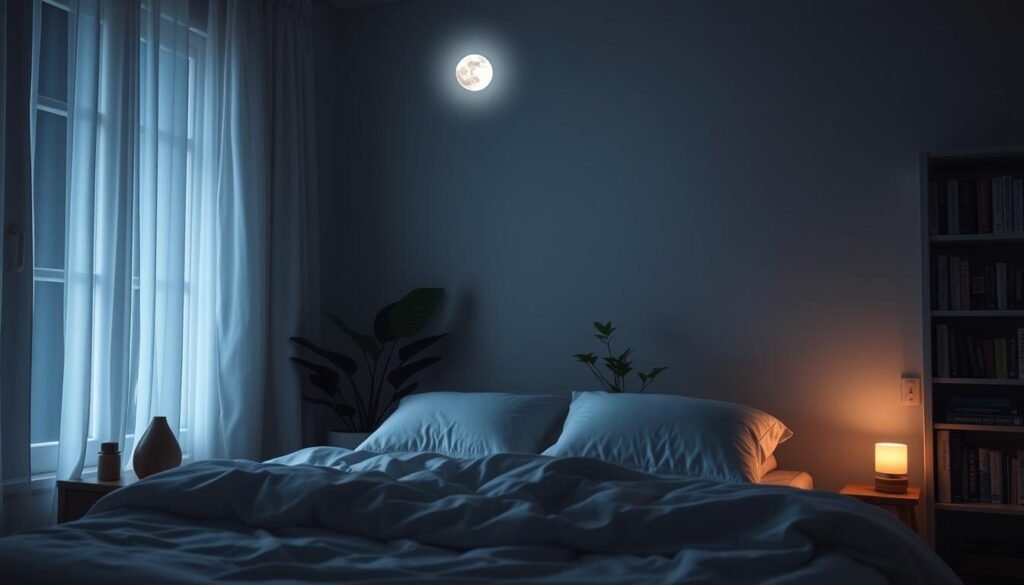Poor mental health and daily worries are keeping millions up at night. The World Health Organization says there’s a big rise in sleep problems linked to mental health. Millions don’t get enough sleep because of these issues.
Studies from the Sleep Association show that stress and mental disorders really mess with sleep. The National Sleep Foundation’s surveys and personal stories show anxiety and stress are big sleep killers.
Key Takeaways
- Poor mental health and everyday worries are keeping millions awake at night.
- World Health Organization reports a global rise in sleep-related problems tied to mental health struggles.
- Psychological stress and mental disorders significantly affect sleep patterns and quality.
- Anxiety and stress are major contributors to sleep disturbances.
- Surveys and personal accounts highlight the impact of mental health on sleep issues.
The Connection Between Mental Health and Sleep
Mental health and sleep are closely linked, affecting each other deeply. It’s important to understand this connection to help with both mental health and sleep issues.
How Mental Health Impacts Sleep
Mental health problems like anxiety, depression, and stress can mess up sleep. Anxiety makes it hard to fall asleep, while depression can cause too much sleep or not enough.
The Science of Sleep and Mental Health
Sleep is key for our brains and emotions. Research in Neuroscience & Biobehavioral Reviews shows bad sleep harms brain function. This can make us more emotional and less able to handle stress, affecting our mental health.
Studies Linking Sleep Disturbances to Mental Health Struggles
Many studies show sleep problems and mental health issues are connected. The Lancet Psychiatry found people with chronic sleep issues are more likely to have mental health problems. These studies highlight the importance of treating sleep issues in mental health care.
Common Mental Health Issues That Cause Sleep Problems
It’s important to understand how mental health affects sleep. Many mental health problems can mess with our sleep patterns. This can lead to sleep disorders. Let’s look at three main areas where mental health and sleep problems meet.
Anxiety and Sleep
Anxiety makes it hard to relax and sleep. It keeps us in a state of alertness, disrupting our natural sleep. To fix this, we need to manage anxiety well. Techniques like cognitive-behavioral therapy and relaxation exercises can help.
Insomnia and Depression
Insomnia and depression often go hand in hand. They make each other worse, leading to long-lasting sleep problems and low mood. It’s key to treat both conditions together to improve mental health and sleep.
Stress and Its Effect on Sleep Patterns
Stress can mess with our hormone balance, especially cortisol. This can disrupt our sleep and lead to insomnia. To improve sleep, we need to manage stress. This can be done through mindfulness, exercise, and a supportive environment.
| Issue | Impact on Sleep | Management Strategies |
|---|---|---|
| Anxiety | Hyperarousal, frequent awakenings | Anxiety management, cognitive-behavioral therapy |
| Depression | Insomnia, low mood | Integrated treatment, medication, therapy |
| Stress | Altered cortisol levels, inconsistent sleep patterns | Stress management, mindfulness, physical activity |
Poor Mental Health and Everyday Worries Are Keeping Millions Awake at Night
Work, personal relationships, and money worries are big sleep problems. The American Journal of Health Promotion says these issues keep millions awake. They hurt our health big time.
Everyday worries make it hard to sleep well. People are looking for help to sleep better. Research in Sleep Health shows we need easy ways to improve sleep.
Cognitive-behavioral therapy and other mental health exercises help a lot. They fight sleep deprivation’s bad effects. Behavioral Sleep Medicine says these methods improve our mental health and sleep.
| Factor | Impact on Sleep | Recommended Strategies |
|---|---|---|
| Work Stress | Interrupts sleep cycle | Cognitive-behavioral therapy |
| Relationship Issues | Causes anxiety and insomnia | Mental well-being exercises |
| Financial Concerns | Leads to restless nights | Sleep hygiene practices |
Anxiety Management and Sleep Quality
Managing anxiety is key to getting good sleep. There are many ways to lower anxiety and sleep better. We’ll look at mindfulness, meditation, relaxation techniques, and therapy for anxiety.

Mindfulness and Meditation
Mindfulness and meditation are great for reducing anxiety and improving sleep. Studies show they calm the mind. They help break the cycle of worry that keeps you awake.
Relaxation Techniques Before Bed
Using relaxation techniques before bed can make sleep better. Harvard Medical School suggests activities like guided imagery and deep breathing. These can help you relax and sleep better, managing anxiety.
Therapeutic Approaches to Reduce Anxiety
Psychotherapy, especially cognitive-behavioral therapy (CBT), is very effective for anxiety. The American Family Physician says CBT is a top choice for anxiety-related sleep problems. It helps tackle anxiety’s causes, leading to better sleep and less anxiety.
Sleep Deprivation Effects on Mental Health
Chronic sleep deprivation is closely tied to mental health issues. These include mood swings, cognitive problems, and a higher risk of psychiatric disorders. It’s crucial to focus on sleep quality in mental health care.
Studies show that sleep deprivation has long-term effects. It can cause neurocognitive damage and lower mental health. It’s important to find ways to cope with sleep deprivation to avoid these problems.
The table below shows the big mental health effects of chronic sleep deprivation:
| Mental Health Impact | Description |
|---|---|
| Mood Swings | Frequent and intense emotional changes that affect daily life. |
| Cognitive Impairment | Less ability to process info, focus, and make decisions. |
| Increased Susceptibility to Psychiatric Disorders | Higher risk of depression, anxiety, and bipolar disorder. |
| Long-term Neurocognitive Damage | Persistent cognitive problems and brain changes. |
| Overall Mental Health Decline | General decline in mental well-being and quality of life. |
To tackle mental health struggles due to lack of sleep, we need a broad approach. Effective coping strategies for sleep deprivation include behavioral therapies, lifestyle changes, and mindfulness. These aim to improve sleep quality and mental health.
Effective Stress Relief Techniques to Enhance Sleep
Adding stress relief techniques to your daily life can help your sleep. Activities and a calm bedroom are key. They make a big difference.
Exercise and Mental Well-being
Exercise is proven to lower stress, which helps you sleep better. Aerobic, strength training, or yoga are all good. They release happy hormones and help your mood.
This better mood means you sleep more soundly.
Healthy Coping Strategies for Stress
Good ways to handle stress can lead to better sleep. Managing time well, talking to friends, and being mindful are helpful. Doing these regularly helps you relax and sleep well.
Creating a Stress-Free Bedroom Environment
A calm bedroom is key for good sleep. Making your room quieter and more relaxing helps a lot. Keep it tidy and free from gadgets for a peaceful place to rest.
| Stress Relief Technique | Benefits |
|---|---|
| Exercise | Enhances mental well-being, improves sleep quality |
| Healthy Coping Strategies | Reduces stress, promotes consistent sleep |
| Stress-Free Bedroom | Creates a sleep-conducive environment |
Insomnia Prevention Tips for Improved Sleep
Creating a consistent sleep routine, eating a balanced diet, and avoiding stimulants are key. These steps help prevent insomnia and ensure a good night’s sleep. Together, they boost sleep quality and overall health.
Establishing a Sleep Routine
Having a regular sleep schedule is vital for fighting insomnia. Going to bed and waking up at the same time every day helps your body’s internal clock. This makes it easier to fall asleep and wake up feeling refreshed.
Diet and Sleep Connection
Your diet greatly affects your sleep. Studies show that when and what you eat can impact sleep quality. Eating foods high in magnesium and tryptophan can help improve sleep. Avoid heavy or spicy meals before bed to prevent sleep disruptions.
Avoiding Stimulants Before Bed
It’s important to avoid stimulants before bed. Caffeine, nicotine, and some medications can make it hard to fall asleep. Try to limit these substances, especially in the hours before bedtime. Doctors often suggest avoiding caffeine and nicotine for at least four to six hours before bed.
| Tip | Action | Benefit |
|---|---|---|
| Sleep Routine | Consistent sleep/wake times | Regulates internal clock, better sleep quality |
| Diet/Sleep | Eat sleep-promoting foods | Enhances sleep quality, minimizes disruptions |
| Avoid Stimulants | Limit caffeine/nicotine intake | Reduces sleep onset latency, improves sleep duration |
Conclusion
Mental health and sleep are closely linked, needing a mix of prevention and treatment. Anxiety, depression, and stress make it hard to sleep well. Knowing this is key for better health.
Making sleep a big part of mental health care helps a lot. Mindfulness, a calm space, and regular sleep times are important. These steps help sleep and mental health together.
As we learn more and share this info, it’s clear we must tackle sleep problems. Good sleep and mental health care improve life quality. By following these steps, we can all sleep better and feel better.






